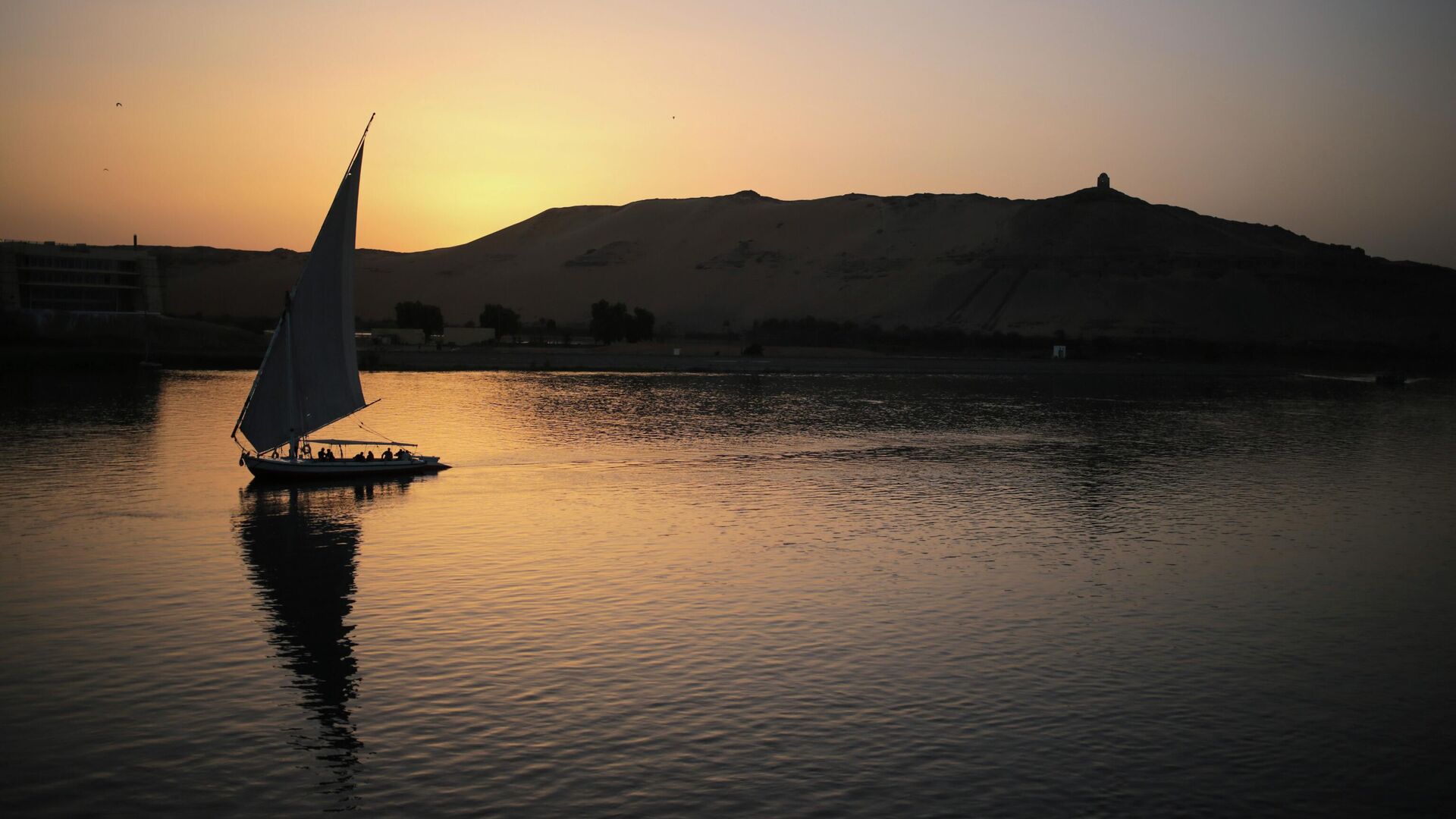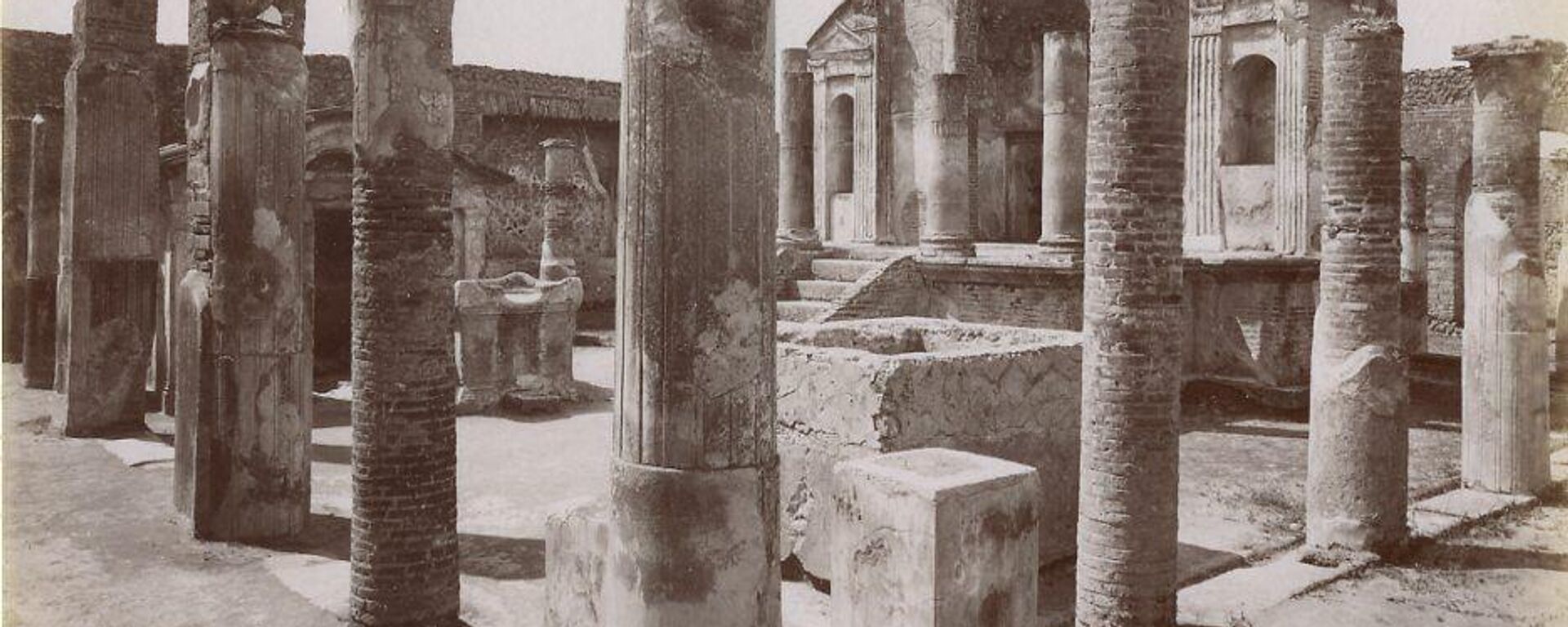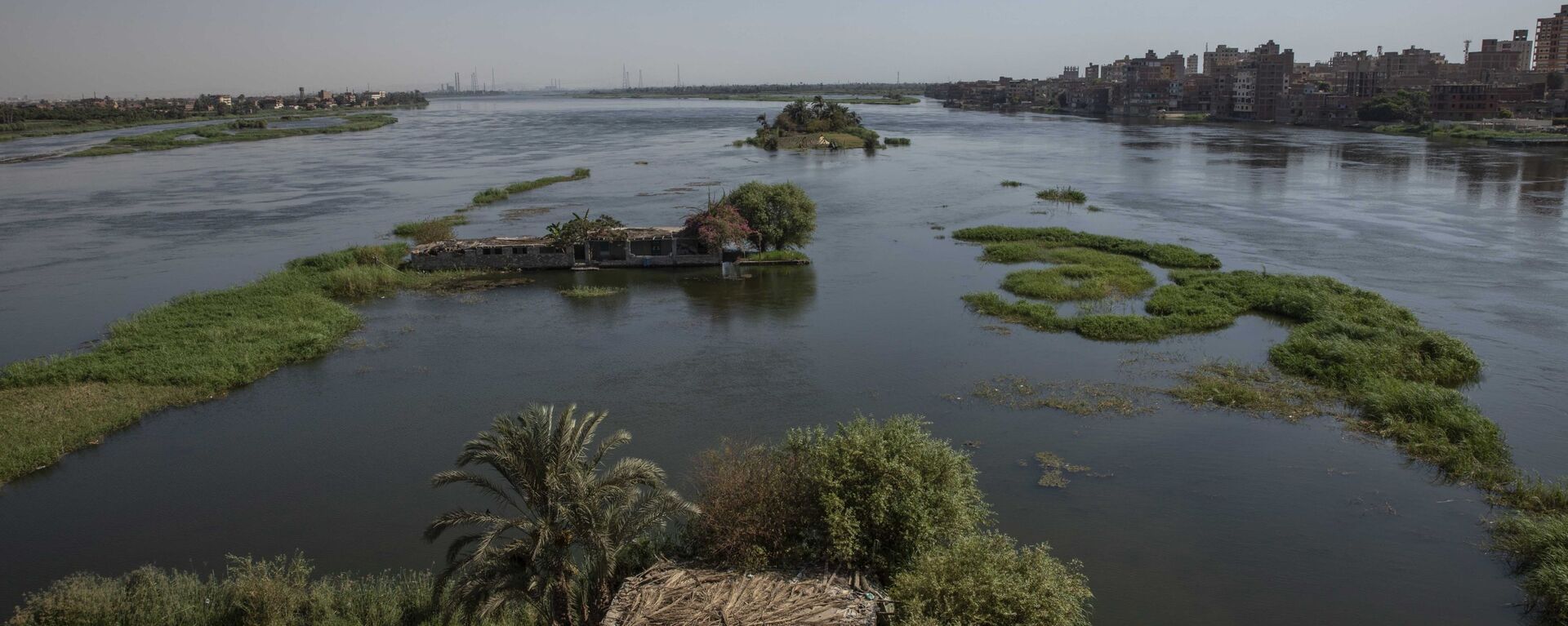https://en.sputniknews.africa/20230816/wafaa-el-nil-celebrating-the-niles-blessings-in-egypt-1061376498.html
Wafaa El-Nil: Celebrating the Nile's Blessings in Egypt
Wafaa El-Nil: Celebrating the Nile's Blessings in Egypt
Sputnik Africa
Egyptians celebrate the annual Wafaa El-Nil or Nile Flooding Festival, an ancient tradition that honors the Nile and its life-giving floods. With its name... 16.08.2023, Sputnik Africa
2023-08-16T17:48+0200
2023-08-16T17:48+0200
2023-08-16T17:48+0200
north africa
ancient egypt
egypt
sudan
festival
national holiday
holidays
features
https://cdn1.img.sputniknews.africa/img/07e7/08/10/1061379520_0:276:3072:2004_1920x0_80_0_0_e9ccfd3d3a21fb52955ac520edc27788.jpg
The Nile has been the backbone of the Egyptian civilization since ancient times, providing water, food, and transportation for millions of people. The annual flooding of the Nile, which usually occurs between July and September, was seen as a divine gift that enriched the soil and ensured a bountiful harvest.The Nile is the longest river in the world, with an estimated length of 6,650 kilometers. It flows from south to north through 11 countries in East Africa: Tanzania, Uganda, Rwanda, Burundi, Democratic Republic of Congo, Kenya, Ethiopia, Eritrea, South Sudan, Sudan and Egypt. The Nile has two major tributaries: the White Nile and the Blue Nile.The White Nile originates from Lake Victoria, the largest lake in Africa, and joins the Blue Nile at Khartoum, the capital of Sudan. The Blue Nile originates from Lake Tana in Ethiopia and contributes about 60% of the Nile's water and silt. The Nile also has a third tributary, the Atbara River, which joins the Nile near the border between Sudan and Egypt.The Flooding of the Nile Festival has its roots in the ancient Egyptian mythology, where the flooding of the Nile was associated with different stories and beliefs. One of them was that the Nile was a man who came to Egypt to marry the land, and his flood was a sign of his love and fertility.Another one was that the flood was the tears of Isis, the "goddess" of life and magic, who mourned for her husband Osiris, the "god" of death and resurrection, who was killed by his brother Set, the "god" of chaos and disorder.The ancient Egyptians also used the Nile as a basis for their calendar, which was divided into three seasons based on the river’s cycle: Akhet (Inundation), Peret (Growth), and Shemu (Harvest). The first season, Akhet, started with the heliacal rising of Sirius, the brightest star in the sky, which coincided with the onset of the Nile's rise. The Egyptians used dams, dykes, and canals to control and distribute the water to their fields, creating a sophisticated system of basin irrigation. They also built two "Nile-meters" or "Nileometer" to measure water levels in Aswan.The festival is also celebrated by the Coptic Church, which is the largest Christian denomination in Egypt. The Copts have a tradition of throwing a martyr's relic into the river, hence the name "The Martyr's Finger". The relic is believed to be a finger of St. Mark, the evangelist who brought Christianity to Egypt.Today, the Wafaa El-Nil festival is a modern event that aims to raise awareness about the importance of preserving the Nile and its environment. On Tuesday, Dr. Abbas Sharaki, a professor of geology and water resources at Cairo University, told Russian media that this year's festival is expected to pass without flooding for the first time in the history of Wafaa El-Nil, which dates back to before the ancient Egyptian era more than 7,000 years ago, noting that the Aswan High Dam saved Egypt from disaster.He added that the ongoing filling of the Grand Ethiopian Renaissance Dam (GERD) also played a significant role in the delay of the floods this year.Wafaa El-Nil Festival features various activities such as boat races, concerts, art exhibitions, and poetry competitions. The festival also offers free entrance to historic sights and monuments along the Nile, including Sebils and the Nileometer. People can also visit multiple historical museums along the Nile, such as Suhag National Museum, Al-Atony Museum, Aswan Museum, and the High Dam.One of the most famous verses written about the Nile, the birthplace of great civilizations such as Ancient Egypt and the Kingdom of Kush in neighboring Sudan, is "The Nile" poem by Hafez Ibrahim:The Wafaa El-Nil festival is a unique opportunity to celebrate the Nile's blessings and appreciate its role in shaping Egypt’s history, culture, and identity. It is also a chance to reflect on how to protect this precious resource from pollution, overuse, and climate change. As the ancient Egyptian proverb says: "If you drink from the Nile, you will return to it."
https://en.sputniknews.africa/20230501/offerings-to-egyptian-goddess-isis-discovered-in-italys-pompeii-1058966560.html
https://en.sputniknews.africa/20230714/egypt-ethiopia-agree-to-reach-deal-on-nile-dam-in-four-months-1060535096.html
north africa
ancient egypt
egypt
sudan
Sputnik Africa
feedback@sputniknews.com
+74956456601
MIA „Rossiya Segodnya“
2023
Muhammad Nooh Osman
https://cdn1.img.sputniknews.africa/img/07e7/04/0a/1058467512_0:0:1280:1280_100x100_80_0_0_ec723833bcbfcaed2e21952965ad99e4.jpg
Muhammad Nooh Osman
https://cdn1.img.sputniknews.africa/img/07e7/04/0a/1058467512_0:0:1280:1280_100x100_80_0_0_ec723833bcbfcaed2e21952965ad99e4.jpg
News
en_EN
Sputnik Africa
feedback@sputniknews.com
+74956456601
MIA „Rossiya Segodnya“
Sputnik Africa
feedback@sputniknews.com
+74956456601
MIA „Rossiya Segodnya“
Muhammad Nooh Osman
https://cdn1.img.sputniknews.africa/img/07e7/04/0a/1058467512_0:0:1280:1280_100x100_80_0_0_ec723833bcbfcaed2e21952965ad99e4.jpg
north africa, ancient egypt, egypt, sudan, festival, national holiday, holidays
north africa, ancient egypt, egypt, sudan, festival, national holiday, holidays
Wafaa El-Nil: Celebrating the Nile's Blessings in Egypt
Muhammad Nooh Osman
Writer/Editor
Egyptians celebrate the annual Wafaa El-Nil or Nile Flooding Festival, an ancient tradition that honors the Nile and its life-giving floods. With its name meaning "Fidelity of the Nile," the festival takes place every year on August 15 and lasts for two weeks. It features various cultural activities along the banks of the world's longest river.
The Nile has been the backbone of the
Egyptian civilization since ancient times, providing water, food, and transportation for millions of people. The annual flooding of the Nile, which usually occurs between July and September, was seen as a divine gift that enriched the soil and ensured a bountiful harvest.
The Nile is the longest river in the world, with an estimated length of 6,650 kilometers. It flows from south to north through 11 countries in East Africa: Tanzania, Uganda, Rwanda, Burundi, Democratic Republic of Congo, Kenya, Ethiopia, Eritrea, South Sudan, Sudan and Egypt. The Nile has two major tributaries: the White Nile and the Blue Nile.
The White Nile originates from Lake Victoria, the largest lake in Africa, and joins the Blue Nile at Khartoum, the capital of Sudan. The Blue Nile originates from Lake Tana in Ethiopia and contributes about 60% of the Nile's water and silt. The Nile also has a third tributary, the Atbara River, which joins the Nile near the border between Sudan and Egypt.
The Flooding of the Nile Festival has its roots in the
ancient Egyptian mythology, where the flooding of the Nile was associated with different stories and beliefs. One of them was that the Nile was a man who came to Egypt to marry the land, and his flood was a sign of his love and fertility.
Another one was that the flood was the tears of Isis, the "goddess" of life and magic, who mourned for her husband Osiris, the "god" of death and resurrection, who was killed by his brother Set, the "god" of chaos and disorder.
The ancient Egyptians also used the Nile as a basis for their calendar, which was divided into three seasons based on the river’s cycle: Akhet (Inundation), Peret (Growth), and Shemu (Harvest). The first season, Akhet, started with the heliacal rising of Sirius, the brightest star in the sky, which coincided with the onset of the Nile's rise.
The Egyptians used dams, dykes, and canals to control and distribute the water to their fields, creating a sophisticated system of basin irrigation. They also built two "Nile-meters" or "Nileometer" to measure water levels in Aswan.
The festival is also celebrated by the Coptic Church, which is the largest Christian denomination in Egypt. The Copts have a tradition of throwing a martyr's relic into the river, hence the name "The Martyr's Finger". The relic is believed to be a finger of St. Mark, the evangelist who brought Christianity to Egypt.
Today, the Wafaa El-Nil festival is a modern event that aims to raise awareness about the importance of preserving the Nile and its environment.
On Tuesday, Dr. Abbas Sharaki, a professor of geology and water resources at Cairo University, told Russian media that this year's festival is expected to pass without flooding for the first time in the history of Wafaa El-Nil, which dates back to before the ancient Egyptian era more than 7,000 years ago, noting that the Aswan High Dam saved Egypt from disaster.
He added that the ongoing filling of the Grand Ethiopian Renaissance Dam (GERD) also played a significant role in the delay of the floods this year.
"The floodwaters in early August now come to a halt at Lake Nasser in front of the High Dam, and for the first time this year, the flood does not arrive on time due to the filling of the Renaissance Dam, which began at the beginning of the season and is expected to continue until next September," Sharaki said.
Wafaa El-Nil Festival features various activities such as boat races, concerts, art exhibitions, and poetry competitions. The festival also offers free entrance to historic sights and monuments along the Nile, including Sebils and the Nileometer. People can also visit multiple historical museums along the Nile, such as Suhag National Museum, Al-Atony Museum, Aswan Museum, and the High Dam.
One of the most famous verses written about the Nile, the birthplace of great civilizations such as Ancient Egypt and the
Kingdom of Kush in neighboring Sudan, is "The Nile" poem by Hafez Ibrahim:
O Nile! Thou art great and beneficent,
Thou art life itself to this land.
Thou art father and mother in one,
Thou art brother and sister and friend.
Thou art wealth and glory and power,
Thou art wisdom and justice and grace.
Thou art past and present and future,
Thou art Egypt - her spirit and face.
The Wafaa El-Nil festival is a unique opportunity to celebrate the Nile's blessings and appreciate its role in shaping Egypt’s history, culture, and identity. It is also a chance to reflect on how to protect this precious resource from pollution, overuse, and climate change. As the ancient Egyptian proverb says: "If you drink from the Nile, you will return to it."




